- Home
- Tahereh Mafi
Ignite Me Page 3
Ignite Me Read online
Page 3
Warner raises his eyebrows. Gestures for me to continue.
“Then . . . you hit some kind of a switch,” I say, forcing myself to keep talking. I don’t know why I’m beginning to doubt myself. “And these huge, metal spikes started coming out of the ground. And then”—I hesitate, steeling myself—“a toddler walked in. He was blindfolded. And you said he was your replacement. You said that if I didn’t save him, you wouldn’t either.”
Warner is looking at me closely now. Studying my eyes. “Are you sure I said that?”
“Yes.”
“Yes?” He cocks his head. “Yes, you saw me say that with your own eyes?”
“N-no,” I say quickly, feeling defensive, “but there were loudspeakers—I could hear your voice—”
He takes a deep breath. “Right; of course.”
“I did,” I tell him.
“So after you heard me say that, what happened?”
I swallow hard. “I had to save the boy. He was going to die. He couldn’t see where he was going and he was going to be impaled by those spikes. I had to pull him into my arms and try to find a way to hold on to him without killing him.”
A beat of silence.
“And did you succeed?” Warner asks me.
“Yes,” I whisper, unable to understand why he’s asking me this when he saw it all happen for himself. “But the boy went limp,” I say. “He was temporarily paralyzed in my arms. And then you hit another switch and the spikes disappeared, and I let him down and he—he started crying again and bumped into my bare legs. And he started screaming. And I . . . I got so mad at you . . .”
“That you broke through concrete,” Warner says, a faint smile touching his lips. “You broke through a concrete wall just to try and choke me to death.”
“You deserved it,” I hear myself say. “You deserved worse.”
“Well,” he sighs. “If I did, in fact, do what you say I did, it certainly sounds like I deserved it.”
“What do you mean, if you did? I know you did—”
“Is that right?”
“Of course it’s right!”
“Then tell me, love, what happened to the boy?”
“What?” I freeze; icicles creep up my arms.
“What happened,” he says, “to that little boy? You say that you set him on the ground. But then you proceeded to break through a concrete wall fitted with a thick, six-foot-wide mirror, with no apparent regard for the toddler you claim was wandering around the room. Don’t you think the poor child would’ve been injured in such a wild, reckless display? My soldiers certainly were. You broke down a wall of concrete, love. You crushed an enormous piece of glass. You did not stop to ascertain where the blocks or the shattered bits had fallen or who they might’ve injured in the process.” He stops. Stares. “Did you?”
“No,” I gasp, blood draining from my body.
“So what happened after you walked away?” he asks. “Or do you not remember that part? You turned around and left, just after destroying the room, injuring my men, and tossing me to the floor. You turned around,” he says, “and walked right out.”
I’m numb now, remembering. It’s true. I did. I didn’t think. I just knew I needed to get out of there as fast as possible. I needed to get away, to clear my head.
“So what happened to the boy?” Warner insists. “Where was he when you were leaving? Did you see him?” A lift of his eyebrows. “And what about the spikes?” he says. “Did you bother to look closely at the ground to see where they might’ve come from? Or how they might’ve punctured a carpeted floor without causing any damage? Did you feel the surface under your feet to be shredded or uneven?”
I’m breathing hard now, struggling to stay calm. I can’t tear myself away from his gaze.
“Juliette, love,” he says softly. “There were no speakers in that room. That room is entirely soundproof, equipped with nothing but sensors and cameras. It is a simulation chamber.”
“No,” I breathe, refusing to believe. Not wanting to accept that I was wrong, that Warner isn’t the monster I thought he was. He can’t change things now. Can’t confuse me like this. This isn’t the way it’s supposed to work. “That’s not possible—”
“I am guilty,” he says, “of forcing you to undergo such a cruel simulation. I accept the fault for that, and I’ve already apologized for my actions. I only meant to push you into finally reacting, and I knew that sort of re-creation would quickly trigger something inside of you. But good God, love”—he shakes his head—“you must have an absurdly low opinion of me if you think I would steal someone’s child just to watch you torture it.”
“It wasn’t real?” I don’t recognize my own raspy, panicked voice. “It wasn’t real?”
He offers me a sympathetic smile. “I designed the basic elements of the simulation, but the beauty of the program is that it will evolve and adapt as it processes a soldier’s most visceral responses. We use it to train soldiers who must overcome specific fears or prepare for a particularly sensitive mission. We can re-create almost any environment,” he says. “Even soldiers who know what they’re getting into will forget that they’re performing in a simulation.” He averts his eyes. “I knew it would be terrifying for you, and I did it anyway. And for hurting you, I feel true regret. But no,” he says quietly, meeting my eyes again. “None of it was real. You imagined my voice in that room. You imagined the pain, the sounds, the smells. All of it was in your mind.”
“I don’t want to believe you,” I say to him, my voice scarcely a whisper.
He tries to smile. “Why do you think I gave you those clothes?” he asks. “The material of that outfit was lined with a chemical designed to react to the sensors in that room. And the less you’re wearing, the more easily the cameras can track the heat in your body, your movements.” He shakes his head. “I never had a chance to explain what you’d experienced. I wanted to follow you immediately, but I thought I should give you time to collect yourself. It was a stupid decision, on my end.” His jaw tenses. “I waited, and I shouldn’t have. Because when I found you, it was too late. You were ready to jump out a window just to get away from me.”
“For good reason,” I snap.
He holds up his hands in surrender.
“You are a terrible person!” I explode, throwing the rest of the pillows at his face, angry and horrified and humiliated all at once. “Why would you put me through something like that when you know what I’ve been through, you stupid, arrogant—”
“Juliette, please,” he says, stepping forward, dodging a pillow to reach for my arms. “I am sorry for hurting you, but I really think it was worth—”
“Don’t touch me!” I jerk away, glaring, clutching the foot of his bed like it might be a weapon. “I should shoot you all over again for doing that to me! I should—I should—”
“What?” He laughs. “You’re going to throw another pillow at me?”
I shove him, hard, and when he doesn’t budge, I start throwing punches. I’m hitting his chest, his arms, his stomach, and his legs, anywhere I can reach, wishing more than ever that he weren’t able to absorb my power, that I could actually crush all the bones in his body and make him writhe in pain beneath my hands. “You . . . selfish . . . monster!” I keep throwing poorly aimed fists in his direction, not realizing how much the effort exhausts me, not realizing how quickly the anger dissolves into pain. Suddenly all I want to do is cry. My body is shaking in both relief and terror, finally unshackled from the fear that I’d caused another innocent child some kind of irreparable damage, and simultaneously horrified that Warner would ever force such a terrible thing on me. To help me.
“I’m so sorry,” he says, stepping closer. “I really, truly am. I didn’t know you then. Not like I do now. I’d never do that to you now.”
“You don’t know me,” I mumble, wiping away tears. “You think you know me just because you’ve read my journal—you stupid, prying, privacy-stealing asshole—”
“Oh, r
ight—about that—” He smiles, one quick hand plucking the journal out of my pocket as he moves toward the door. “I’m afraid I wasn’t finished reading this.”
“Hey!” I protest, swiping at him as he walks away. “You said you’d give that back to me!”
“I said no such thing,” he says, subdued, dropping the journal into his own pants pocket. “Now please wait here a moment. I’m going to get you something to eat.”
I’m still shouting as he closes the door behind him.
SEVEN
I fall backward onto the bed and make an angry noise deep inside my throat. Chuck a pillow at the wall.
I need to do something. I need to start moving.
I need to finish forming a plan.
I’ve been on the defense and on the run for so long now that my mind has often been occupied by elaborate and hopeless daydreams about overthrowing The Reestablishment. I spent most of my 264 days in that cell fantasizing about exactly this kind of impossible moment: the day I’d be able to spit in the face of those who’d oppressed me and everyone else just beyond my window. And though I dreamed up a million different scenarios in which I would stand up and defend myself, I never actually thought I’d have a chance to make it happen. I never thought I’d have the power, the opportunity, or the courage.
But now?
Everyone is gone.
I might be the only one left.
At Omega Point I was happy to let Castle lead. I didn’t know much about anything, and I was still too scared to act. Castle was already in charge and already had a plan, so I trusted that he knew best; that they knew better.
A mistake.
I’ve always known, deep down, who should be leading this resistance. I’ve felt it quietly for some time now, always too scared to bring the words to my lips. Someone who’s got nothing left to lose and everything to gain. Someone no longer afraid of anyone.
Not Castle. Not Kenji. Not Adam. Not even Warner.
It should be me.
I look closely at my outfit for the first time and realize I must be wearing more of Warner’s old clothes. I’m drowning in a faded orange T-shirt and a pair of gray sweatpants that almost falls off my hips every time I stand up straight. I take a moment to regain my equilibrium, testing my full weight on the thick, plush carpet under my bare feet. I roll the waistband of the pants a few times, just until they sit snugly at my hip bone, and then I ball up the extra material of the T-shirt and knot it at the back. I’m vaguely aware that I must look ridiculous, but fitting the clothes to my frame gives me some modicum of control and I cling to it. It makes me feel a little more awake, a little more in command of my situation. All I need now is a rubber band. My hair is too heavy; it’s begun to feel like it’s suffocating me, and I’m desperate to get it off my neck. I’m desperate to take a shower, actually.
I spin around at the sound of the door.
I’m caught in the middle of a thought, holding my hair up with both hands in a makeshift ponytail, and suddenly acutely aware of the fact that I’m not wearing any underwear.
Warner is holding a tray.
He’s staring at me, unblinking. His gaze sweeps across my face, down my neck, my arms. Stops at my waist. I follow his eyes only to realize that my movements have lifted my shirt and exposed my stomach. And I suddenly understand why he’s staring.
The memory of his kisses along my torso; his hands exploring my back, my bare legs, the backs of my thighs, his fingers hooking around the elastic band of my underwear—
Oh
I drop my hands and my hair at the same time, the brown waves falling hard and fast around my shoulders, my back, hitting my waist. My face is on fire.
Warner is suddenly transfixed by a spot directly above my head.
“I should probably cut my hair,” I say to no one in particular, not understanding why I’ve even said it. I don’t want to cut my hair. I want to lock myself in the toilet.
He doesn’t respond. He carries the tray closer to the bed and it’s not until I spot the glasses of water and the plates of food that I realize exactly how hungry I am. I can’t remember the last time I ate anything; I’ve been surviving off the energy recharge I received when my wound was healed.
“Have a seat,” he says, not meeting my eyes. He nods to the floor before folding himself onto the carpet. I sit down across from him. He pushes the tray in front of me.
“Thank you,” I say, my eyes focused on the meal. “This looks delicious.”
There’s tossed salad and fragrant, colorful rice. Diced, seasoned potatoes and a small helping of steamed vegetables. A little cup of chocolate pudding. A bowl of fresh-cut fruit. Two glasses of water.
It’s a meal I would’ve scoffed at when I first arrived.
If I knew then what I know now, I would’ve taken advantage of every opportunity Warner had given me. I would’ve eaten the food and taken the clothes. I would’ve built up my strength and paid closer attention when he showed me around base. I would’ve been looking for escape routes and excuses to tour the compounds. And then I would’ve bolted. I would’ve found a way to survive on my own. And I never would’ve dragged Adam down with me. I never would’ve gotten myself and so many others into this mess.
If only I had eaten the stupid food.
I was a scared, broken girl, fighting back the only way I knew how. It’s no wonder I failed. I wasn’t in my right mind. I was weak and terrified and blind to the idea of possibility. I had no experience with stealth or manipulation. I hardly knew how to interact with people—could barely understand the words in my own head.
It shocks me to think how much I’ve changed in these past months. I feel like a completely different person. Sharper, somehow. Hardened, absolutely. And for the first time in my life, willing to admit that I’m angry.
It’s liberating.
I look up suddenly, feeling the weight of Warner’s gaze. He’s staring at me like he’s intrigued, fascinated. “What are you thinking about?” he asks.
I stab a piece of potato with my fork. “I’m thinking I was an idiot for ever turning down a plate of hot food.”
He raises an eyebrow at me. “I can’t say I disagree.”
I shoot him a dirty look.
“You were so broken when you got here,” he says, taking a deep breath. “I was so confused. I kept waiting for you to go insane, to jump on the table at dinner and start taking swipes at my soldiers. I was sure you were going to try and kill everyone, and instead, you were stubborn and pouty, refusing to change out of your filthy clothes and complaining about eating your vegetables.”
I go pink.
“At first,” he says, laughing, “I thought you were plotting something. I thought you were pretending to be complacent just to distract me from some greater goal. I thought your anger over such petty things was a ruse,” he says, his eyes mocking me. “I figured it had to be.”
I cross my arms. “The extravagance was disgusting. So much money is wasted on the army while other people are starving to death.”
Warner waves a hand, shaking his head. “That’s not the point. The point,” he says, “is that I hadn’t provided you with any of those things for some calculated, underhanded reason. It wasn’t some kind of a test.” He laughs. “I wasn’t trying to challenge you and your scruples. I thought I was doing you a favor. You’d come from this disgusting, miserable hole in the ground. I wanted you to have a real mattress. To be able to shower in peace. To have beautiful, fresh clothes. And you needed to eat,” he says. “You’d been starved half to death.”
I stiffen, slightly mollified. “Maybe,” I say. “But you were crazy. You were a controlling maniac. You wouldn’t even let me talk to the other soldiers.”
“Because they are animals,” he snaps, his voice unexpectedly sharp.
I look up, startled, to meet his angry, flashing green eyes.
“You, who have spent the majority of your life locked away,” he says, “have not had the opportunity to understand just how beautifu
l you are, or what kind of effect that can have on a person. I was worried for your safety,” he says. “You were timid and weak and living on a military base full of lonely, fully armed, thickheaded soldiers three times your size. I didn’t want them harassing you. I made a spectacle out of your display with Jenkins because I wanted them to have proof of your abilities. I needed them to see that you were a formidable opponent—one they’d do well to stay away from. I was trying to protect you.”
I can’t look away from the intensity in his eyes.
“How little you must think of me.” He shakes his head in shock. “I had no idea you hated me so much. That everything I tried to do to help you had come under such harsh scrutiny.”
“How can you be surprised? What choice did I have but to expect the worst from you? You were arrogant and crass and you treated me like a piece of property—”
“Because I had to!” He cuts me off, unrepentant. “My every move—every word—is monitored when I am not confined to my own quarters. My entire life depends on maintaining a certain type of personality.”
“What about that soldier you shot in the forehead? Seamus Fletcher?” I challenge him, angry again. Now that I’ve let it enter my life, I’m realizing anger comes a little too naturally to me. “Was that all a part of your plan, too? No wait, don’t tell me”—I hold up a hand—“that was just a simulation, right?”
Warner goes rigid.
He sits back; his jaw twitches. He looks at me with a mixture of sadness and rage in his eyes. “No,” he finally says, deathly soft. “That was not a simulation.”
“So you have no problem with that?” I ask him. “You have no regrets over killing a man for stealing a little extra food? For trying to survive, just like you?”
Warner bites down on his bottom lip for half a second. Clasps his hands in his lap. “Wow,” he says. “How quickly you jump to his defense.”

 Shatter Me
Shatter Me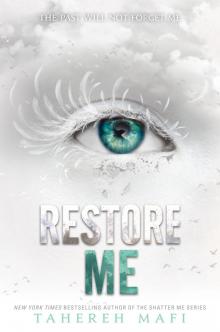 Restore Me
Restore Me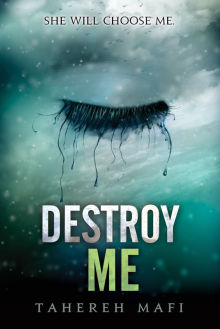 Destroy Me
Destroy Me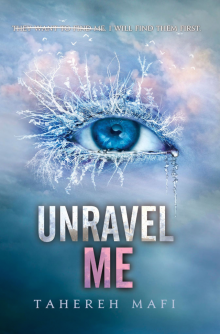 Unravel Me
Unravel Me Ignite Me
Ignite Me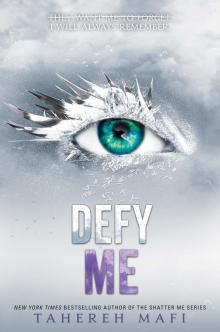 Defy Me
Defy Me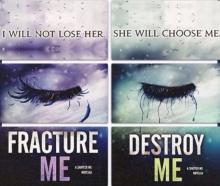 Fracture Me
Fracture Me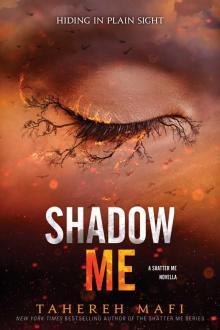 Shadow Me
Shadow Me Whichwood
Whichwood Reveal Me
Reveal Me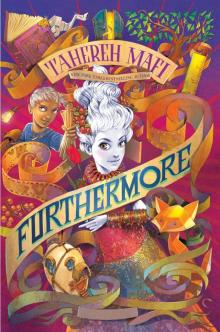 Furthermore
Furthermore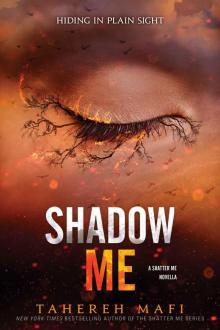 Shadow Me (Shatter Me Novella)
Shadow Me (Shatter Me Novella) Believe Me
Believe Me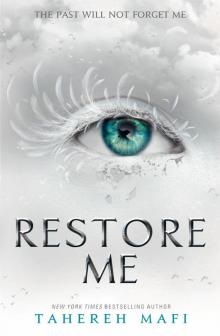 Restore Me (Shatter Me)
Restore Me (Shatter Me)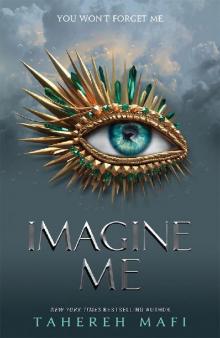 Imagine Me
Imagine Me An Emotion of Great Delight
An Emotion of Great Delight Find Me
Find Me A Very Large Expanse of Sea
A Very Large Expanse of Sea Unravel Me: The Juliette Chronicles Book 2
Unravel Me: The Juliette Chronicles Book 2